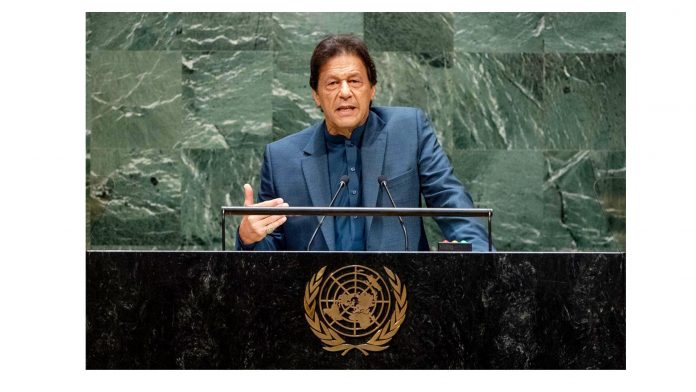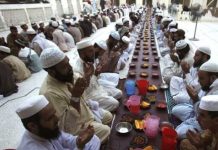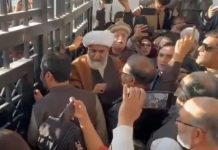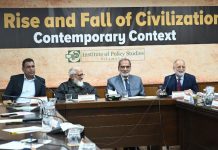Mr. President,
Secretary General Guterres,
Excellencies,
Ladies and Gentlemen,
I am honoured to address the United Nations General Assembly once again. I congratulate His Excellency Mr. Volkan Bozkir on his election as the President of the seventy-fifth session of the General Assembly.
We also appreciate the skilful leadership of the outgoing President, His Excellency Tijani Muhammad-Bande, especially during the COVID-19 crisis.
We commend the leadership of the Secretary General in these extremely turbulent times.
Mr. President,
Since my government assumed office, our consistent effort has been to fundamentally transform Pakistan.
We envisage ‘Naya Pakistan’ to be modeled on the principles of the State of Madinah, established by our Holy Prophet Muhammad (P.B.U.H).
A just and humane society where all Government policies are directed at lifting our citizens out of poverty and creating a just and equitable dispensation.
To achieve this goal, we need to have peace and stability. Thus our foreign policy aims to have peace with our neighbours and settle disputes through dialogue.
Mr. President,
The 75th Anniversary of the United Nations is an extremely important milestone as this is the only body in the world that can help us achieve our goals of peace and stability in our neighbourhood. This is also a time for us to reflect whether as the United Nations we have been able to realize the promise we collectively made to our peoples.
Today, the foundations of the ‘world order’– non-use of or threat of unilateral force, self-determination of peoples, the sovereign equality and territorial integrity of States, non-interference in their internal affairs, international cooperation – all these ideals are being systematically eroded.
International agreements are being flouted and set aside.
Renewed great-power rivalries are leading to a new arms race.
Conflicts are proliferating and intensifying.
Military occupation and illegal annexations are suppressing the rights of human beings to self-determination.
According to respected Professor Noam Chomsky, mankind is at even a greater risk than it was before the 1st and 2nd World Wars in the last century, and this is because of the increased threat of nuclear war, Climate Change, and sadly the rise of authoritarian regimes. We must come together to prevent such a catastrophe.
We believe that the driving force in international relations must be cooperation, in accordance with the principles of international law, and not confrontation and force.
We all must emphatically reaffirm our support for multilateralism.
Mr. President,
The COVID-19 pandemic has illustrated the oneness of humanity. In our interconnected world, no one is safe unless everyone is safe.
Locking down to control the pandemic has triggered the worst recession since the Great Depression in the last Century. This has hit the poorest countries the hardest as well as the poor in all the countries.
In Pakistan, we realized very early on that if we imposed a strict lockdown, the type that several affluent countries had imposed, we would have more people dying of hunger than the virus.
Therefore, we adopted a policy of ‘smart lockdown.’ While concentrating on the virus hot-spots we opened up our agricultural sector immediately and then followed it up by the construction sector, which employed most of the people.
At the same time, and this is despite financial constraints, my government deployed an unprecedented 8 billion dollars for our health services; plus support the poorest and most vulnerable households with direct cash payments through Ehsaas programme; and then subsidies to the small businesses.
Even though our ‘smart lockdown’ was heavily criticized in the beginning, but thanks to Almighty Allah’s Grace, we have not only managed to control the virus, stabilize our economy, but most importantly, we have been able to protect the poorest segment of the society from the worst fall out of the lock down.
Today, Pakistan’s response is cited among the success stories in controlling and responding to the pandemic. However, we are still not out of the woods, like no country is out of the woods today.
Mr. President,
It was obvious from the outset that developing countries would need fiscal space to respond to, and recover from, the COVID crisis.
Debt relief is one of the best ways to create that fiscal space for developing countries. Therefore, in early April, I called for a “Global Initiative on Debt Relief”.
We appreciate the G-20’s official debt suspension initiative and the emergency and rapid financing offered by the IMF, World Bank, Asian Development Bank and UN Agencies.
This, however, is not going to be enough.
The IMF has estimated that developing countries will need over US$ 2.5 trillion to respond and recover from the crisis.
The official debt suspension will need to be extended and expanded. Additional debt relief measures will also be needed.
Development Banks should ensure adequate financial inflows.
Rich countries have generated over ten trillion dollars to finance their own response and recovery. They should support the creation of at least US$500 billion in new Special Drawing Rights for the developing world.
Mr. President,
In my address to the General Assembly last year, I had highlighted the tremendous damage that illicit financial flows from developing countries to rich countries and to offshore tax havens cause. This leads to the impoverishment of the developing nations. Money that could be used towards human development is siphoned off by corrupt elites. The loss of foreign exchange causes currency depreciation that in turn leads to inflation and poverty.
The quest for getting back these stolen resources is nearly impossible, given the cumbersome procedures. Moreover, the powerful money launderers have access to the best lawyers. And sadly, because they are the beneficiaries, there is a lack of political will in the rich countries to curb this criminal activity.
Mr. President,
If this phenomena is unaddressed, it will continue to accentuate the inequality between the rich and the poor nations, and eventually will spark off a far bigger global crisis than the present migration issue poses.
The rich states cannot hold forth on human rights and justice when they provide sanctuary to money launderers’ and their looted wealth.
There are robust anti-Money Laundering and anti-Terrorist Financing regimes. I call upon this Assembly to take the lead in efforts to build a global framework to stem the illicit financial flows and ensure speedy repatriation of stolen wealth.
It is important to realize that the aid that flows from rich countries to the developing world is miniscule compared to the massive out-flows by our corrupt elites.

















